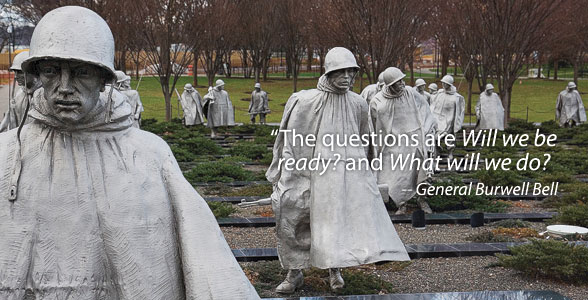Burwell Bell is the second-highest-ranking four-star general in the U.S. Army. He is the U.S. military leader in Korea, charged with maintaining relations with South Korea and monitoring the hornets’ nest of North Korea. But when Bell came to the University of Tennessee to speak, he was–for a time–just “B.B.,” a friend, relative, and diehard Vols fan.
A native of Oak Ridge, Tennessee, Bell graduated from UT Chattanooga in 1969 with a bachelor’s degree in business administration. He began his military career in ROTC there, and he has served on the UTC Alumni Board. He’s married to the former Kathleen “Katie” Fields of Chattanooga. They have one grown son.
As the U.S. military leader in Korea, Bell heads three groups: the U.S.-Republic of Korea Combined Forces Command, which is responsible for conducting defensive operations against North Korea should deterrence fail; the United Nations Command, which is responsible for maintaining the armistice signed in 1953 to end hostilities on the Korean Peninsula; and the U.S. Forces, Korea, which is responsible for the readiness, training, and welfare of all military service members and families assigned to the Korean Peninsula.
Titled “Korea and the United States: Prosperity or Parting Ways,” Bell’s presentation at UT was sponsored by the Howard H. Baker Jr. Center for Public Policy. Bell said North Korea’s aggression and the friction between the U.S. and South Korea have direct economic impacts on Tennessee and the rest of the U.S.
“This is not an esoteric issue for Tennessee. This is about bread and butter,” he said. “This is something worth your study and your consideration.” Northeast Asia accounts for one-half of the world’s population, one-fourth of the world’s economic output, 24 percent of world trade, and 25 percent of U.S. trade.
The U.S. and South Korea have been allies for 53 years, ever since the Korean armistice. That relationship has become somewhat strained, however, because South Korea, officially the Republic of Korea (ROK), is exploring different approaches to relations with North Korea, or the Democratic People’s Republic of Korea (DPRK), and how the South will provide for its national defense. Increasingly, the South Koreans are feeling that they don’t need to have the U.S. endorse their every move, Bell explained.
 For instance, South Korea wants to expand business relationships with North Korea and has invested in some ventures there. But the U.S. fears the ROK may be inadvertently funding terrorist activities, as the DPRK government skims a portion of the wages its citizens receive for working in the South Korean companies.
For instance, South Korea wants to expand business relationships with North Korea and has invested in some ventures there. But the U.S. fears the ROK may be inadvertently funding terrorist activities, as the DPRK government skims a portion of the wages its citizens receive for working in the South Korean companies.
Each of the Koreas’ economic situation is inevitably intertwined with the country’s military ambitions. Bell showed nighttime aerial photographs of the Korean Peninsula. Dotted with lights, South Korea–a nation of 47 million people–appears vibrant and alive at night, while North Korea is completely dark. The contrast illustrates the difference between the two nations of the peninsula. While South Korea is thriving economically, the DPRK’s population is poor, hungry, and isolated.
“It’s guns over butter,” Bell said, showing pictures of malnourished North Korean children. “If you’re in the military, your kids don’t look like that. It’s a Cold War–style militarized society that makes no sense in the 21st century. It’s wildly out of place.”
Bell said the DPRK leader, Kim Jong Il, is intent on the survival of his regime and the reunification of the peninsula under his terms. To achieve those goals, he wants to split the U.S.-South Korean alliance and isolate the North Korean populace so they don’t know how much better the rest of the world lives. What the DPRK does have, though, is the world’s fourth-largest military. Most of its troops are located on the border with South Korea, and much of its firepower is aimed at Seoul.
But Bell doesn’t think they will attack South Korea. “It would be a debacle, a disaster for both countries, because the U.S. would have to crush the North Koreans,” he said.
Most worrisome, perhaps, Bell said, is the DPRK’s posturing toward the U.S. In the last 6 months North Korea has conducted rocket and missile tests that are “unprecedented in its history.” He said the North Koreans recently conducted the largest naval exercises he’s seen.
In early October, they tested a nuclear weapon. And when the six-nation nuclear disarmament talks resumed in December 2006 after a 13-month boycott by the North, the DPRK opened with a claim to nuclear-power status and set its own conditions for disarming. “They are demonstrating their capability to the U.S.,” Bell said.
The other big concern, he said, is that North Korea may sell weaponry to rogue nations or multinational terrorists. “The U.S. is working real hard to keep a lid on Northeast Asia,” Bell said. “Should the day come that North Korea tries to take on America, the U.S. will have to act. The questions are Will we be ready? and What will we do?”
The Baker Center, which opened in 2003, is a nonpartisan center dedicated to creating a better understanding of government and fostering a greater appreciation for the importance of public service. The center offers programs for students, teachers, and the public, and houses a collection of political papers.



